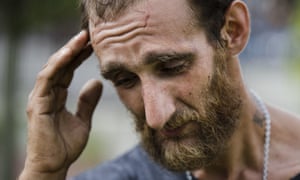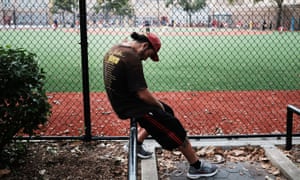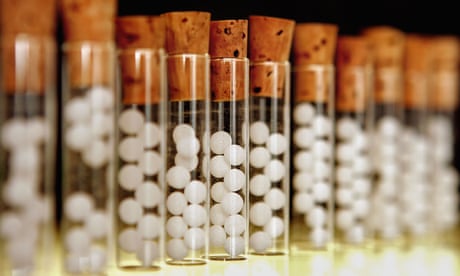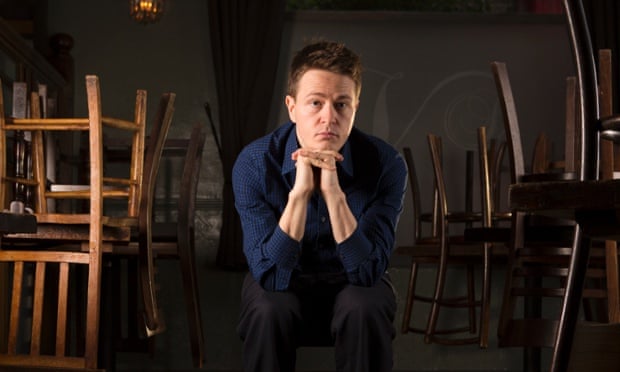Time moves differently in the middle of the night. Hours can drag one moment, then race by the next, catapulting you between chronic boredom and violent panic that morning is clawing at the curtains. Yet, though it may not feel like it in the moment, it is entirely normal to wake up. “The natural human sleep pattern is not a consolidated eight hours,” says Russell Foster, professor of circadian neuroscience at Oxford University, and author of Life Time: The new science of the body clock, and how it can revolutionise your sleep and health. Still, it’s not pleasant to lie awake in the early hours worrying about everything from climate catastrophe to whether that was an inappropriate joke to put on that group chat, or whether you’ll ever sleep again – especially if it happens regularly. Here is some expert advice on how to stay calm plus what to do so that – hopefully – sleep will follow.
Crack a smile
It’s easy to catastrophise in the middle of the night, says Alanna Hare, consultant in sleep medicine at the Royal Brompton and Harefield hospitals. “‘I’m going to perform really badly at work tomorrow, then I’ll lose my job, then my partner will leave me’ – it can escalate quite quickly. Try to move away from this idea that being awake in the night is a dreadful thing that’s going to lead to terrible consequences.” Camilla Stoddart, a sleep coach, advises smiling, which may stop or slow the spiralling. “Smiling releases serotonin and dopamine, and triggers the parasympathetic nervous system, which is the opposite of the system that controls your fight and flight response. If you can disengage from the struggle, you’re more likely to get back to sleep.”
Tackle stress
When we can’t get back to sleep, it’s usually because our minds are busy or we’re worried about something (though to rule out a sleep problem such as restless legs or sleep apnoea, it’s best to see your GP). “Most of us don’t have a sleep problem, we have an anxiety and stress problem,” says Foster. In our waking life, Foster advises “finding techniques that work for you, whether it’s mindfulness, yoga, whatever. It’s important to de-stress.” Talking to a therapist and tackling unresolved problems might be helpful; some simple meditation or gratitude practice might be enough, says Nerina Ramlakhan, physiologist and author of Fast Asleep, Wide Awake. “Don’t push problems away, don’t deny that you’re not feeling great about your relationship or your job or whatever it is that’s bothering you. Those emotions, if they’re not expressed, have a tendency to pop up in sleep, either in nightmares, or in difficulty getting to sleep or staying asleep.”
Consider your life stage
We tend to wake up more as we age, says Foster, “because the robustness of the circadian drive for sleep reduces – we’re probably not going to get the sleep that we got when we were younger”. Hormones underpinning urine production also change as we age, which is one reason why older people often need to get up to go to the loo at night. Menopause affects women’s sleep in several ways, including body temperature – if you sleep with a partner, consider getting separate duvets to help with this – and changing hormone levels. “Oestrogen can promote sleep, and so can progesterone, by making you more relaxed and less anxious,” says Foster. “Those changing hormones can disrupt those patterns, and it’s the same with the menstrual cycle.”
We tend to wake up more as we age, says Foster, “because the robustness of the circadian drive for sleep reduces – we’re probably not going to get the sleep that we got when we were younger”. Hormones underpinning urine production also change as we age, which is one reason why older people often need to get up to go to the loo at night. Menopause affects women’s sleep in several ways, including body temperature – if you sleep with a partner, consider getting separate duvets to help with this – and changing hormone levels. “Oestrogen can promote sleep, and so can progesterone, by making you more relaxed and less anxious,” says Foster. “Those changing hormones can disrupt those patterns, and it’s the same with the menstrual cycle.”
Adopt healthy habits
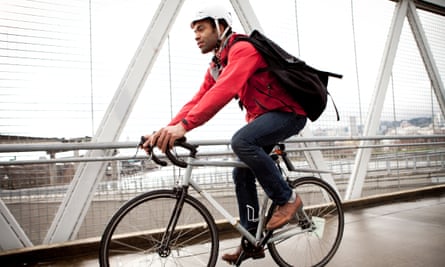
The way we sleep is a reflection of the way we live, says Ramlakhan, “so if you want to sleep better, you have to live better”. You know what you need to do: exercise, nutrition, stress reduction. Ramlakhan has her list of “five non-negotiables, which can help you sleep more deeply. Eating breakfast within half an hour of rising [to stabilise your blood sugar levels], not using caffeine as a substitute for food, making sure you’re well hydrated, getting to bed earlier – about 9.30-10pm – and cultivating a healthier relationship with technology.” She isn’t a particular fan of the label “sleep hygiene” because it can feel like a chore to run through a bedtime routine which might include putting devices away, dimming the lights and having a warm bath. “Those things might help,” says Ramlakhan, “but actually, it’s the way we live from the moment we wake up until the time we’re getting into bed that is going to have an impact on how you sleep.”
Do some journalling before bed
Getting worries or busy thoughts out of your head, even the next day’s to-do list, before bed might help, says Stoddart. If the worries are bigger – such as the threat of nuclear war – “you just acknowledge that you can’t really do anything about that, especially not in the middle of the night”. Hare recommends “constructive worry” – you can find examples online to print and follow. “It is a way of organising your thoughts by writing them down in a particular fashion, so that when you wake in the night, you’re less likely to start list-making or worrying.”
Getting worries or busy thoughts out of your head, even the next day’s to-do list, before bed might help, says Stoddart. If the worries are bigger – such as the threat of nuclear war – “you just acknowledge that you can’t really do anything about that, especially not in the middle of the night”. Hare recommends “constructive worry” – you can find examples online to print and follow. “It is a way of organising your thoughts by writing them down in a particular fashion, so that when you wake in the night, you’re less likely to start list-making or worrying.”
Avoid medication
Foster says sleeping pills can help you sleep, “but they can make it more difficult to wake up and leave you feeling groggy in the morning, and may also increase daytime sleepiness later”. Newer, shorter-acting sleeping pills may work for night waking, “but it’s advisable to make sure you have at least four hours before you need to get up”. Taking melatonin – the tablet form of the hormone that increases at night to make you feel sleepy – will not prevent you from waking, says Foster, but similarly to shorter-acting sedatives, it could help to take it in the night when you wake up. Like sleeping pills, it should be prescribed by your GP, he stresses. Overall, medication should not be used long-term and is “not the answer to waking at night. In almost all cases, non-pharmacological approaches will work.”
Don’t ‘try’ to get back to sleep
“The main mistake people make when they’re struggling to get back to sleep is they lie in bed, often very still because they’re trying not to wake up their partner – but sleep doesn’t respond well to effort,” says Hare.
“The main mistake people make when they’re struggling to get back to sleep is they lie in bed, often very still because they’re trying not to wake up their partner – but sleep doesn’t respond well to effort,” says Hare.
Don’t check the clock

When patients tell her they wake at 2.05am every morning, “therein lies the problem,” says Ramlakhan. Looking at the time “is one of the biggest disruptors to being able to get back to sleep”. It creates anxiety, and worse, says Ramlakhan, you’ll probably check the time on your phone and get sucked into doing other things on it. “Use an old-fashioned alarm clock and turn it away from you,” she says. “It’s not important to know the time. Learn to let go.”
Hare adds that once people start noticing they wake at a similar time each night, perhaps as a result of natural sleep patterns, they “start to develop rules: ‘if I’m awake at this point, I won’t go back to sleep; once I’ve woken at 3am, that’s it for the night’. They’re arbitrary and not true, but they become self-fulfilling prophecies. So try not to look at the clock.”
Don’t look at your phone
We all know we shouldn’t be on our phones in the night but the lure is so great that Hare reports people even do it in her sleep laboratories. Some researchers think the detrimental effect of blue light on sleep from devices has been exaggerated, but with your phone in your hand it’s too easy to check work emails or get sucked into social media.
Don’t concentrate on trying to sleep, but concentrate on reducing hyper-arousal
We all know we shouldn’t be on our phones in the night but the lure is so great that Hare reports people even do it in her sleep laboratories. Some researchers think the detrimental effect of blue light on sleep from devices has been exaggerated, but with your phone in your hand it’s too easy to check work emails or get sucked into social media.
Don’t concentrate on trying to sleep, but concentrate on reducing hyper-arousal
… except to quickly put a mindfulness app on
“As long as you’re popping the app or podcast on, and not looking at the screen after that,” says Hare. “What you don’t want is having bright light in your face for 10 minutes while you scroll through, trying to find something.”
Mindfulness apps can be useful, says Ramlakhan, who has also recorded some of her own meditations including body scans (you can also find free examples on YouTube). “One is a body scan where you start with one foot and you say the words ‘I love my left big toe’ and you work your way up your body.” If you find yourself worrying about something else, or becoming distracted, start again. Another way of quieting a busy mind, says Hare, is using counting techniques. “I often use a very simple one, which is trying to count back from 1,000 in sevens, and if you get stuck, you have to go back to the beginning again.”
… or listen to a story
Foster finds the short plays on BBC Radio 4 Extra relaxing. Stoddart loves audiobooks and podcasts, rather than sitting up to read with the light on, “because there’s no decision to be made as to when you turn it off”. Something intentionally boring may not work for you. “A lot of my clients will listen to the same book over and over, or listen to boring stories designed to send you to sleep, and they don’t really work because you’re not engaged, so you can continue worrying.” By finding something interesting, she has found, you’re less likely to focus on negative thoughts and won’t feel like you’re actively trying to get to sleep, “and sleep is more likely to come”.
Slow your breathing
“Don’t concentrate on trying to sleep, but concentrate on reducing hyper-arousal,” says Stoddart. “I get people to do slow breathing, or some sort of yoga or relaxation before they go to bed, but only with the expectation that it will calm the system down, rather than guarantee sleep.” In the middle of the night, when you start to get anxious, it can take time for stress hormones such as cortisol to pass. “And usually in that time, you’ve found more reasons to keep it going, so slow breathing can speed up that timeframe and keep you calmer. But it is difficult, which is why I suggest reading a book or watching TV – something that makes it easier to be distracted, calmer and will reinforce the message that ‘it’s not so bad to be awake in the middle of the night’, so that you don’t fuel the fire with more anxiety.”
Get up for a while
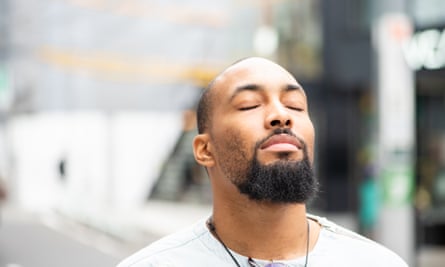 ‘
‘ It feels counterproductive, says Hare, because it’s easy to tell ourselves that if we just lie still for a bit longer, we’ll go to sleep. “If it does feel like you’re about to fall back to sleep, or you’re relaxed, and not worried or anxious, it’s OK to stay where you are. But if you’re starting to think ‘this is terrible’, or that you’re actively trying to sleep, the best thing to do is to get up.” By staying in bed, awake, “you start to develop a conditioned response – that ‘bed’ is about anxiety, frustration and being awake, when what we want is for ‘bed’ to be associated with sleep and relaxation”. Get up for half an hour or so (don’t look at the clock, or time it) and do something enjoyable but relaxing – no eating “because your body is not designed to be digesting in the middle of the night”, and no strenuous exercise or work. “The idea is to break that cycle of negative thinking. Read, watch a bit of TV, as long as you’re not going to get absorbed in some terrifying film, do a hobby, anything you like, as long as you’re not on your device.” She sometimes has to advise people not to watch pornography, because some can get too engrossed in it (but masturbation can be useful as a relaxation aid).
Go back to bed, and if the same thing happens, get up again. “Trust that your sleep biology is very powerful. If you keep taking the wakefulness away from the bed, eventually you will be able to fall back asleep. It might not be within a timeframe that you’re happy with, but the awakenings will get shorter and less frequent.”
Try to stay awake
It’s what’s known as “paradoxical intention” says Hare. Lie down and keep your eyes open. “Sometimes trying to stay awake can bring about sleep – it’s very hard to keep your eyes open, even when you feel you’re wide awake.” It’s not something Hare recommends as a first strategy, but she has recommended it to people who claim they endure being awake for several hours in bed. “It’s unlikely they’re fully awake. Why don’t you try to stay awake for that whole period and see what happens with your eyes open? The whole point is that instead of trying to sleep, it’s just adjusting that attention.”
Don’t give up and get up
With less than an hour before your alarm goes off, you might think you may as well get up, but Foster advises against this. If you can stay relaxed, “lie back and wait for the alarm clock to go off. Chances are, you will fall back to sleep and just that 15 or 20 minutes can be helpful in getting the sleep that you need. Even short sleep can be somewhat beneficial.”Sleep,
